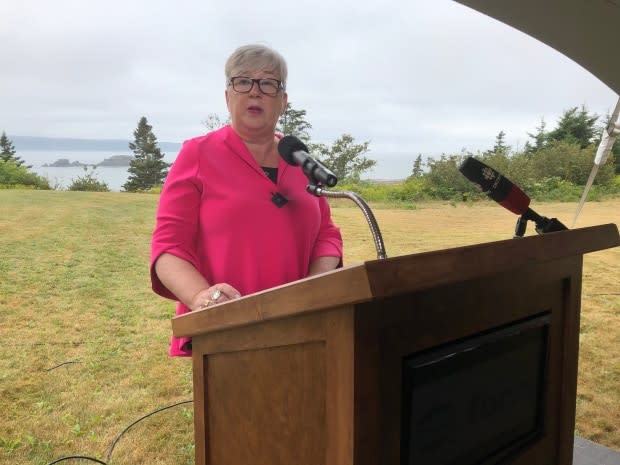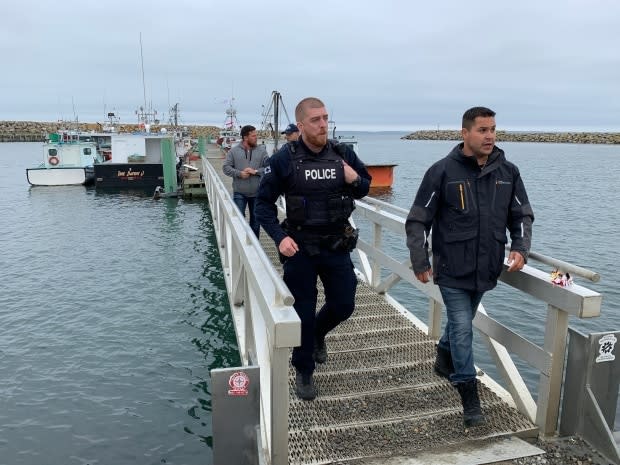Ottawa opens door to First Nations fisheries authority
Fisheries and Oceans Minister Bernadette Jordan said today the federal government is open to the creation of a First Nations fisheries authority, if that's the direction Mi'kmaw chiefs want to take.
Three Mi'kmaw parliamentarians wrote a letter to Jordan, Crown-Indigenous Relations Minister Carolyn Bennett, Indigenous Services Minister Marc Miller and First Nation leaders yesterday proposing a new management body that would allow First Nations to work directly with the Crown to establish fisheries, instead of using the existing band-by-band process through the Department of Fisheries and Oceans.
"That plan is with the chiefs now," Jordan told host Catherine Cullen on CBC's Power and Politics.
"It will be up to them to determine whether or not that is a path they want to follow. Of course, we want to work with the chiefs for whatever they see [as] the best way forward for them."
When asked directly if she would give her consent to the proposed fisheries authority, Jordan said she doesn't want to prejudge negotiations and said the chiefs will come to her if they decide this is something they want to pursue.

Liberal MP Jaime Battiste of Nova Scotia, Progressive Sen. Brian Francis of Prince Edward Island and Independent Sen. Daniel Christmas of Nova Scotia wrote the letter to the ministers after the Sipekne'katik First Nation launched its own Mi'kmaw-regulated, rights-based lobster fishery on Sept. 17 in St. Mary's Bay, about 250 kilometres west of Halifax, during the off season.
In the weeks that followed, non-Indigenous fishermen confronted the First Nation fishermen and removed hundreds of their lobster traps.
Non-Indigenous commercial fishers who work in the area call the Sipekne'katik fishery illegal and accuse it of concealing a large-scale commercial fishery, which the Mi'kmaq deny.
Battiste points to the latest dispute as the reason why a new approach is necessary.
"If the current system was fine, we probably wouldn't have the violent clashes we were having on the water," Battiste told CBC News.
"We need someone to encourage dialogue and create incentives for dialogue."
Learning curve for minister
Martin Mallet, executive director of the Maritime Fishermen's Union, said he isn't sure a new fisheries management body is necessary since there are already advisory committees in place for Indigenous and non-Indigenous fishermen.
"The main thing that needs to be understood is that fisheries management, at the end of the day, has to fit within the scopes of whatever fish ecology that you're trying to manage," Mallet said.
"It should be actually the species that is dictating to us how we fish it, not your ethnic background or who you are as an individual."

Several First Nations on the East Coast are now following in the steps of Sipekne'katik First Nation and getting ready to launch their own fisheries, citing the 1999 Supreme Court of Canada Marshall decision.
The ruling in the case of Donald Marshall Jr. affirmed the right of the Mi'kmaq to earn a "moderate livelihood" from fishing, but did not explain how that fishery would work. The high court later said the federal government could regulate that fishery and must justify any restrictions it placed on it.
In response to the launch of the Sipekne'katik fishery on Sept. 17, Jordan released a statement saying there cannot be a commercial fishery outside of the commercial season until an agreement is reached with her department, and that enforcement was an option.
Jordan also said a sound management framework is necessary for the management and conservation of fish stocks. That statement upset many First Nations people who felt the minister was telling them they had to follow Canada's fishing management model or face consequences.
Jordan appeared to soften her tone the following day in an updated statement that did not mention the need for a framework or enforcement.
Sources close to the negotiations say tensions between Jordan and First Nations eased after her new statement was published and Bennett joined talks with First Nations leaders.
Jordan recently published an op-ed in the Chronicle Herald acknowledging the steep learning curve she's faced and said her department must work with First Nations to launch fisheries from which community members can earn a moderate livelihood.
"The First Nations have been very helpful to me in dealing with them directly, in talking to them, in understanding their rights," Jordan told Power and Politics.
"I think all Canadians should be taking those lessons."


